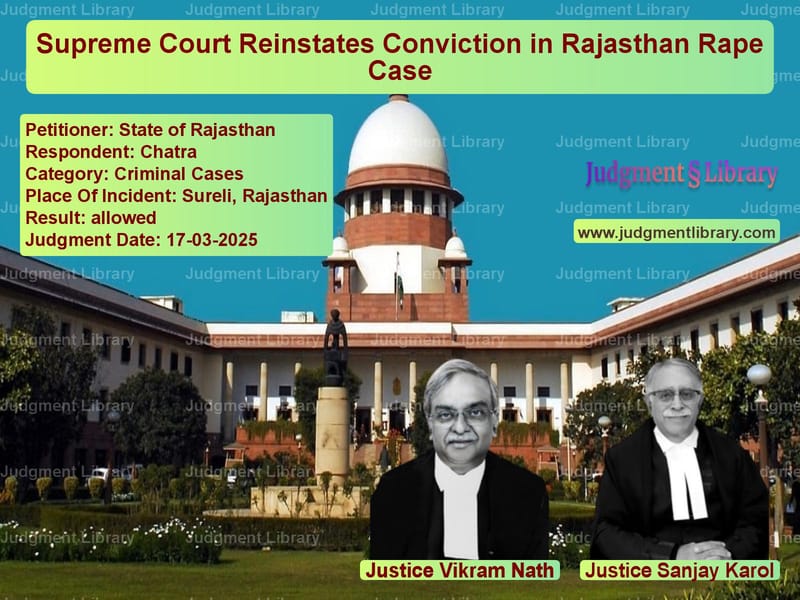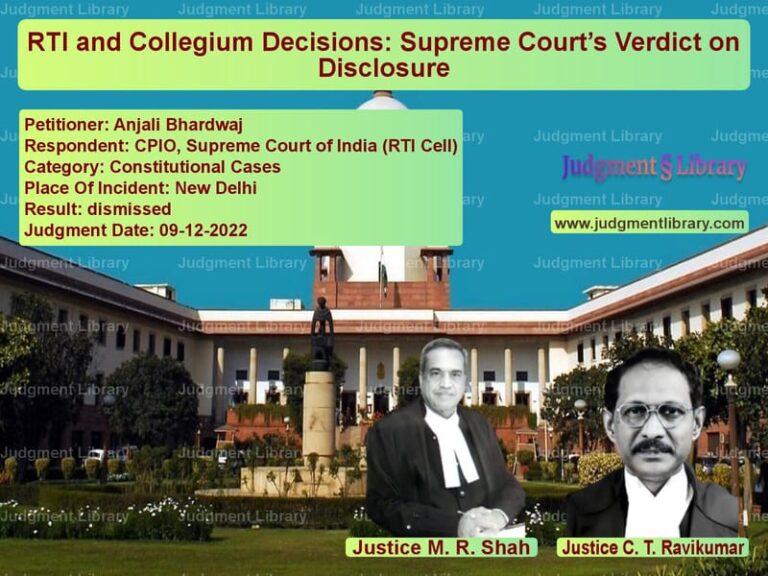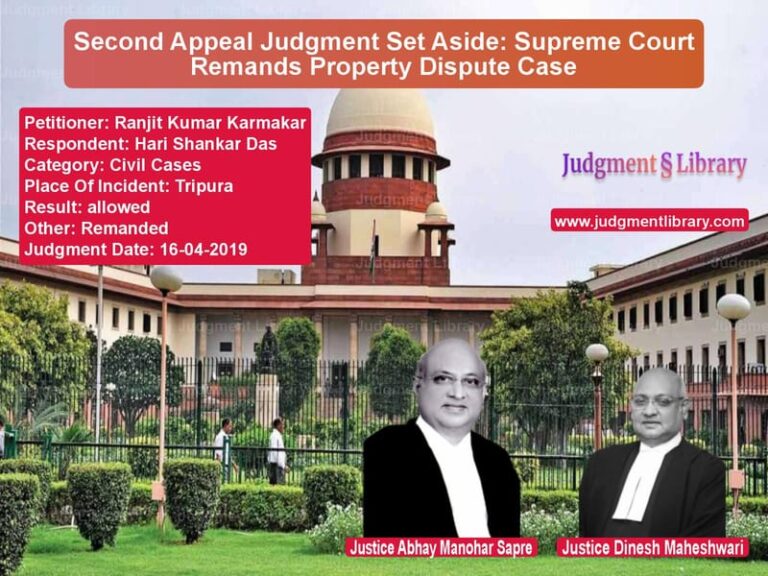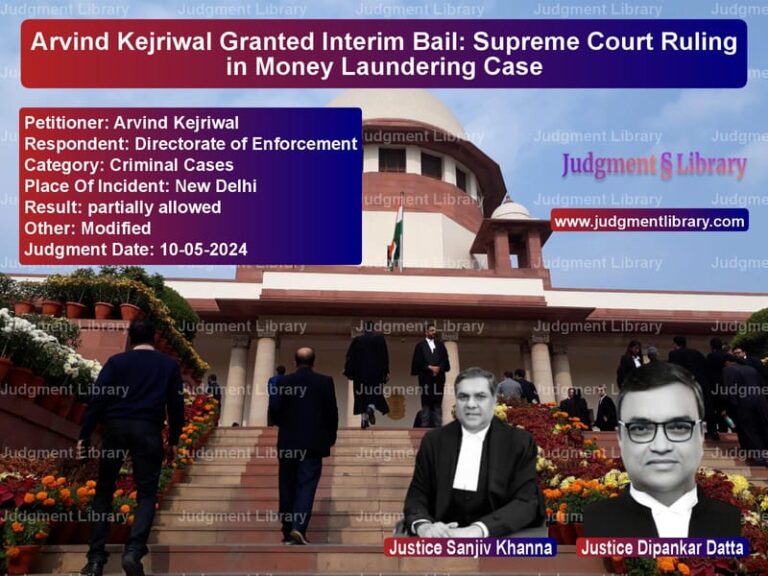Supreme Court Reinstates Conviction in Rajasthan Rape Case
On March 3, 1986, an incident occurred in the village of Sureli, Rajasthan, that shocked the conscience of the community. A minor girl, referred to in legal records as ‘V’, was found unconscious, bleeding, and severely injured. Witness Gulab Chand discovered her lying near a field and saw the accused, Chatra, fleeing the scene. The case led to a decades-long legal battle, raising important questions about the criminal justice system’s handling of sexual assault cases.
The trial court convicted Chatra under Section 376 of the IPC and sentenced him to seven years of rigorous imprisonment. However, the Rajasthan High Court overturned the conviction, citing inconsistencies in witness testimonies and forensic evidence. The State of Rajasthan appealed this decision in the Supreme Court, which ultimately reinstated the conviction, emphasizing the importance of medical evidence, witness credibility, and trauma-informed judicial review.
Background of the Case
On the fateful day, ‘V’ had gone out to graze cattle near her home. When she did not return, her family began searching for her. Gulab Chand, a villager, found her unconscious in a field with injuries indicative of sexual assault. Several villagers saw Chatra fleeing the scene, his clothing disheveled, and reported their observations to the authorities.
A medical examination conducted by Dr. R.K. Sharma at the district hospital confirmed the presence of multiple injuries on the victim’s body, consistent with forced penetration. A forensic report later corroborated these findings, stating:
“There is conclusive evidence of sexual assault. The victim’s injuries are consistent with non-consensual intercourse.”
Legal Proceedings
Trial Court Verdict
The prosecution relied on eyewitness testimonies, forensic reports, and the victim’s medical examination. The trial court found the evidence sufficient to convict Chatra under Section 376 IPC. In its judgment, the court noted:
“The circumstantial evidence, coupled with forensic reports, leaves no room for doubt regarding the accused’s guilt. The defense’s argument regarding an alleged family dispute is unsubstantiated and irrelevant.”
Chatra was sentenced to seven years of rigorous imprisonment.
High Court’s Reversal
On appeal, the Rajasthan High Court overturned the conviction, citing the following reasons:
- Minor inconsistencies in witness statements
- Lack of direct DNA evidence linking the accused to the crime
- The victim’s inability to testify due to trauma
The High Court held:
“In the absence of clear forensic evidence and considering discrepancies in the testimonies, the conviction cannot be upheld beyond reasonable doubt.”
State’s Appeal to the Supreme Court
The State of Rajasthan challenged the High Court’s ruling in the Supreme Court, arguing that the appellate court had failed to consider crucial aspects of the case.
Arguments by the State of Rajasthan:
- The trial court’s judgment was based on sound legal principles and relied on medical and forensic reports.
- The victim’s inability to testify was due to trauma, which should not be held against her.
- Eyewitness accounts and forensic findings corroborated the prosecution’s case.
Arguments by the Defense:
- The case was fabricated due to a long-standing family feud.
- The forensic report did not conclusively establish Chatra’s involvement.
- The High Court’s judgment was correct in finding the evidence insufficient.
Supreme Court’s Observations
The Supreme Court, after reviewing the evidence, found serious flaws in the High Court’s reasoning. Justice Sanjay Karol, delivering the judgment, stated:
“A High Court, in exercising appellate jurisdiction, must not discard material evidence without substantial reasons. The trial court’s findings were well-reasoned, and the High Court erred in disregarding crucial forensic and medical evidence.”
The Supreme Court noted that the medical examination and forensic reports were sufficient to establish sexual assault. Additionally, the victim’s psychological trauma explained her inability to testify effectively.
Key Excerpts from the Judgment
From the Trial Court’s ruling:
“The forensic evidence, medical examination, and eyewitness testimonies collectively establish the guilt of the accused beyond reasonable doubt.”
From the Supreme Court’s decision:
“The gravity of sexual assault cases necessitates a trauma-sensitive approach. The judiciary must not allow procedural technicalities to override substantive justice.”
Final Verdict
The Supreme Court reinstated the trial court’s conviction, sentencing Chatra to seven years of rigorous imprisonment. The Court directed that he be taken into custody immediately.
The ruling serves as a significant precedent in sexual assault cases, emphasizing the need for courts to adopt a trauma-informed perspective and ensuring that survivors receive justice despite procedural challenges.
Petitioner Name: State of Rajasthan.Respondent Name: Chatra.Judgment By: Justice Vikram Nath, Justice Sanjay Karol.Place Of Incident: Sureli, Rajasthan.Judgment Date: 17-03-2025.
Don’t miss out on the full details! Download the complete judgment in PDF format below and gain valuable insights instantly!
Download Judgment: state-of-rajasthan-vs-chatra-supreme-court-of-india-judgment-dated-17-03-2025.pdf
Directly Download Judgment: Directly download this Judgment
See all petitions in Bail and Anticipatory Bail
See all petitions in Juvenile Justice
See all petitions in SC/ST Act Case
See all petitions in Judgment by Vikram Nath
See all petitions in Judgment by Sanjay Karol
See all petitions in allowed
See all petitions in supreme court of India judgments March 2025
See all petitions in 2025 judgments
See all posts in Criminal Cases Category
See all allowed petitions in Criminal Cases Category
See all Dismissed petitions in Criminal Cases Category
See all partially allowed petitions in Criminal Cases Category







